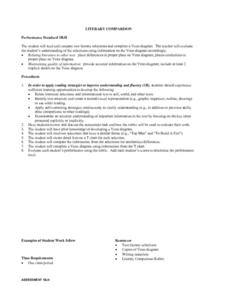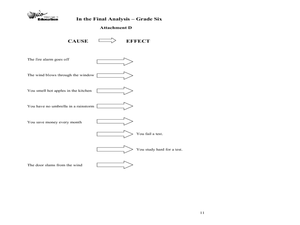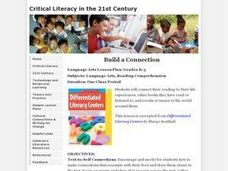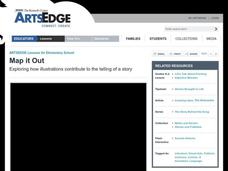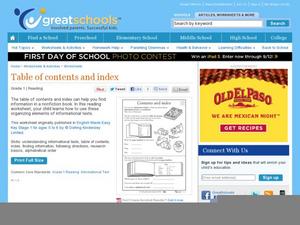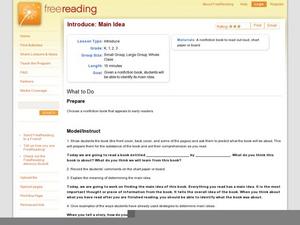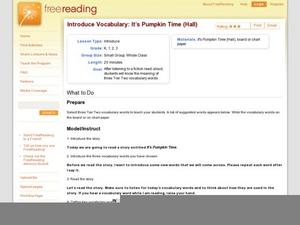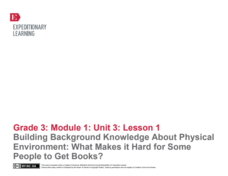Curated OER
Informational Reading: Electronics Are Made from Resources
In this comprehension worksheet, students read about the making of a computer: circuit boards, hard drives, monitors and plastic housings. Students then answer 3 multiples choice questions.
Curated OER
Literary Comparison
Compare and contrast two pieces of literature with this lesson. With the use of a Venn diagram, pupils make connections between literature and real-life situations. They practice skills of surveying a text looking for important details,...
Curated OER
Introducing the Memo
Examine the text structure of a memo with this worksheet. Eighth to twelfth graders decide if the purpose of a memo is to motivate an action or to provide information to the reader. They explore new vocabulary and make predictions prior...
Curated OER
Only the Facts
Practice the strategy of summarizing to gain meaning and knowledge from an informational text. Young readers highlight supporting details and main ideas, and then they use this to summarize two articles: "The Great Quake" and "What is an...
Curated OER
The Final Analysis: Cause and Effect, Fact and Opinion
Middle schoolers read and review informational texts, analyze cause and effect, and distinguish fact from opinion. They assess a "one-minute mystery" you read aloud for cause and effect relationships. Resource includes complete set of...
Curated OER
Build a Connection
Learners discuss their personal connections with stories they've read in the past and identify techniques to connect with more stories. They create illustrations, construct task cards, and complete sentence stems based on books they read...
Curated OER
Selective Underlining Taking Notes
It is so important for learners to become selective and strategic readers. This slide show provides examples and practice exercises that encourage them to read informational text and selectively underline key points or information. Great...
K12 Reader
Narrative or Expository?
Narrative or expository? That is the question readers face on a two-part comprehension worksheet that asks kids to read a short passage about these two different types of writing, and then to answer a series of comprehension questions...
EngageNY
Taking Notes Using a Graphic Organizer: Inferring About the Importance of Religion in Colonial America
Improve class understanding of colonial times by reading an informational text and filling out the accompanying graphic organizer. Class members work with a partner to read, take notes, make inferences, and synthesize information.The...
Great Schools
Different Types of Writing
What type of writing is this? Learners read a brief introduction to various types of text: instructions, explanations, poems, folk tales, novels, informative, and arguments. The introduction doesn't explain these, so consider going over...
Curated OER
Ready-Set-Go-Whoa!
The Apaches: People of the Southwest offers readers a chance to employ the “Ready-Set-Go-Whoa!” strategy (an adaptation of the KWL) to test what they know and summarize what they learn as they read Jennifer Fleischner’s nonfiction...
Curated OER
Is It Fact or Opinion?
Distinguish between fact and opinions in this nonfiction reading lesson. Middle schoolers read 'The Diary of an Early American Boy' and work in groups to analyze the text. They record the facts and opinions for the text.
Curated OER
Map It Out
Explore how illustrations add to a story. Young learners will look at picture books to see how the pictures tell the story. They create illustrations to go with a chosen story, and then flip the activity so they have to write a story to...
K12 Reader
Using Prior Knowledge
Sometimes it's hard to relate to a new text. Teach kids to use their prior knowledge when reading something new with a comprehension exercise. A short passage tells them how to think of their brains like filing systems, and provides five...
Curated OER
Contents and Index
It's important for your readers to understand features of informational text such as index and table of contents, so give them this visual activity to get started. They read a brief explanation of informational text, then look at an...
Curated OER
Report Writing
Why don't dinosaurs wander the earth any longer? Answer this fascinating question with young readers as they examine a brief informational text. There are bolded words to separate text sections which are an excellent example of...
Curated OER
Introduce: Main Idea
Begin exploring main idea in a text by telling the class an interesting story. Can they recall the main idea after you finish? What clues told them this was it? Explain that you will apply this concept as you read a nonfiction book....
Curated OER
Fast Fact-Finding
Ever wonder why the sky changes color so often? Readers examine an informational excerpt from John Farndon's How the Earth Works. They underline key points as they read and then answer five response questions. Prompts review main points,...
Curated OER
Introduce Vocabulary: An Earthworm's Life (Himmelman)
Explore some tier-two vocabulary using John Himmelman's informational text An Earthworm's Life. Recommended words for this slimy text are: bulge, burrow, journey, soil, and underground. After introducing these words, help kids utilize...
Curated OER
Introduce Vocabulary: It's Pumpkin Time (Hall)
Looking for a Halloween-themed vocabulary lesson? Study words in context using Zoe Hall's story It's Pumpkin Time, an excellent informational text for budding readers. The spooky suggested words are: buds, gather, hollow,...
Curated OER
Introduce Vocabulary: Are Trees Alive? (Miller)
Explore the life inside trees as scholars learn vocabulary through Debbie Miller's informational text Are Trees Alive? Familiarize pupils with the new words they will hear like anchor, disease, awaken, harsh, and swell before reading....
Curated OER
Introduce Vocabulary: Have You Seen Bugs? (Oppenheim)
Are your scholars interested in bugs? Get future entomologists excited about vocabulary through Joanne Oppenheim's colorful book Have You Seen Bugs? They use the informational text (although this strategy is useful for any book) to learn...
EngageNY
Building Background Knowledge About Physical Environment: What Makes it Hard for Some People to Get Books?
How far would your pupils go to be able to have access to books? Revisit Heather Henson and David Small's That Book Woman and challenge class members to take on the role of Cal or the Book Woman. By putting themselves in someone else's...
Curated OER
Words in the News: Stem Cell Research
A thorough resource for intermediate English learners addresses reading comprehension of informational texts, adjective forms, vocabulary acquisition, and writing in a journalistic style. Specifically, the class reads about stem cell...



